‘Stereophonic’ Playwright David Adjmi Sets The Record Straight On Rumours, Rock Stars And What’s In Store For Broadway’s Most Tony-Nominated Play Ever
- Oops!Something went wrong.Please try again later.
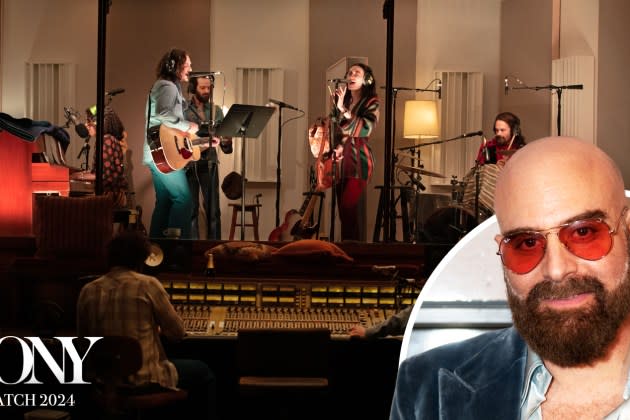
More decades ago than many of us care to admit, a rock and roll album as gorgeous in sound as it was cantankerous in spirit arrived in record stores and on radio charts that could hardly have been less prepared for it. Fleetwood Mac’s Rumours stood along among the Bat Out Of Hells and Cat Scratch Fevers and Saturday Night Fevers. With its blend of voices as miraculous as its personalities were fractious, the era’s signature musical document was as much a mirror of its time as Sgt. Pepper’s Lonely Hearts Club Band had been a decade earlier.
Forty-seven years later, David Adjmi’s Stereophonic is doing for theater what Stevie and Lindsey and all the rest did for FM radio way back when, injecting a vivid life into an overcrowded, near-moribund landscape with a verve that strikes nary a false note.
More from Deadline
Broadway Spring 2024: Sufjan Stevens ‘Illinoise’ & All Of Deadline’s Reviews
The Making Of ‘Illinoise’ And The Guiding Vision Of Sufjan Stevens – Tony Watch Q&A With Justin Peck
Stereophonic, set entirely within the confines of a late-’70s-era West Coast recording studio, follows an unnamed rock band as they scramble to make the album that they suspect – and we know – will make their career and rock history. To be sure: Stereophonic isn’t a jukebox musical, nor is it by-the-numbers biography. Rather, Adjmi, whose previous plays include the raucous comedy 3C about a Three’s Company-like farce, has pieced together the bone structure of Fleetwood Mac with characters that correspond to the real-life bandmates and a series of tempestuous recording sessions that chart the all-too-famililar musical highs and lows and romantic ups and downs.
But Stereophonic is no documentary. The inner lives of its characters are pure Adjmi. What, his imagination ponders, must it have been like to be those Golden Gods, those icons of a generation? Can we ever really know? What does it say about us that we want so badly to figure it out? And isn’t just loads of fun to make the effort?
One of the few runaway hits of the Broadway Spring 2024 Season, Stereophonic set a new record for the most Tony nominations ever handed to a play (beating Slave Play by one). The nominations are:
Best Play – David Adjmi
Best Director – Daniel Aukin
Best Score – Will Butler
Best Orchestrations – Will Butler and Justin Craig
Best Featured Actor in a Play – Will Brill
Best Featured Actor in a Play – Eli Gelb
Best Featured Actor in a Play – Tom Pecinka
Best Featured Actress in Play – Juliana Canfield
Best Featured Actress in a Play – Sarah Pidgeon
Best Scenic Design of a Play – David Zinn
Best Costume Design of a Play – Enver Chakartash
Best Lighting Design of Play – Jiyoun Chang
Best Sound Design of a Play – Ryan Rumery
In this interview, playwright Adjmi offers a candid look at his inspiration for the play, the grueling process of finding every last, perfect cast member and design artist, and where Stereophonic goes from here. To skip ahead just a bit: Yes, he’s already writing a film version.
Stereophonic is playing at Broadway’s John Golden Theatre through August 18, 2024.
The 77th Tony Awards will be held on June 16, 2024, at Lincoln Center’s David H. Koch Theater in New York City, and will air on CBS.
The following interview has been edited and condensed for clarity and length.
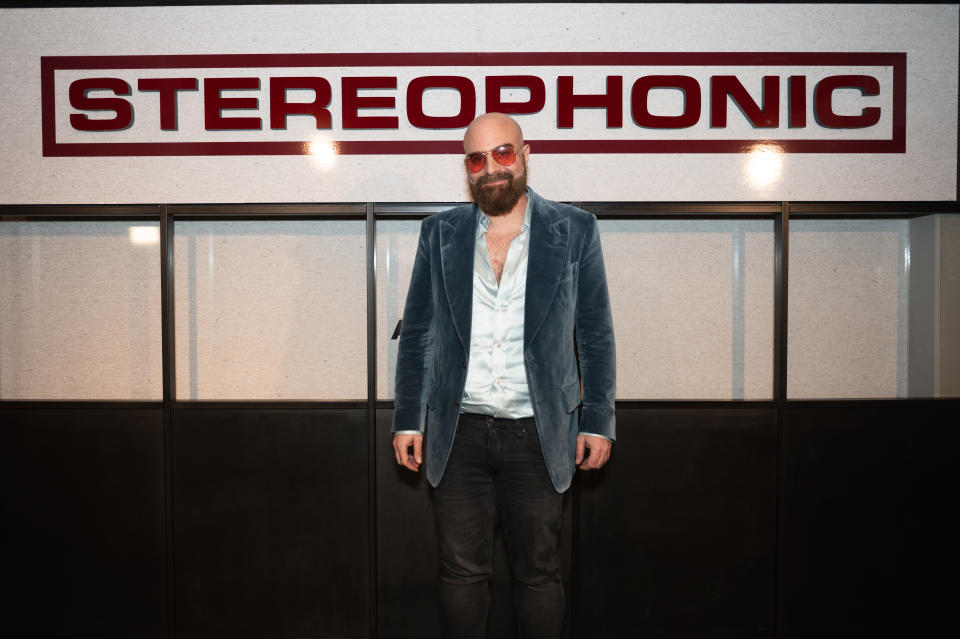
DEADLINE: I’m wondering what your thoughts are on why a story about a ’70s rock band resonates so much with people in 2024.
DAVID ADJMI: First of all, the music is great, and most people really like music I’ve learned, including me, and I think that people really love really dimensional characters. I think that people respond to the characters and there is something very mesmerizing about watching a play where no one is giving you, like, a legend or a map about how to feel about anything. I’m just immersing you in the world of these characters with all of their complexities and it’s up to you to figure out how to navigate that as the spectator, and I think there’s something exciting about that for people. Of course some people get frustrated with that.
DEADLINE: I went in thinking I already knew the story of Fleetwood Mac and Rumours, but then…Have you ever had the experience of playing an old record you’ve been listening to forever and someone says, Wait listen to that bass part under the mix, and suddenly you hear the entire song in an entirely different way. That’s how I felt about Stereophonic. You presented something I thought I knew and I didn’t.
ADJMI: Or maybe you still don’t because I don’t know…this is all my fantasy. It’s a fantasia and it comes from my imagination because no one would let me into a recording studio to watch all this stuff. So, this is how I intuited what it could be like outside of all the pageantry of rock music and the blown-out mythologies that we’re exposed to. I just thought, Well it can’t be that all the time, can it? I mean these people are just people. So, what does it look like when they’re not on stage performing? Who are these people? That was always so interesting to me.
DEADLINE: And you captured these characters at a time when they were still real people and not the golden gods that they are about to become. That point in time is fascinating to me.
ADJMI: But they always stay real people. Everyone stays real people. They never become gods to themselves, but they can get lost in the distorting mirror of fame because what fame does is it changes the people around you. It doesn’t change you. It changes the world around you and then when you see yourself in that mirror it can become quite confusing and I think some of these characters are getting inklings of that, or little premonitions of, How am I going to be seen by the world and what is that going to do to me and who am I in all of this? Who am I in this weird admixture of art and fame and life? How do I maintain my balance?
DEADLINE: That’s got to be at least part of the reason why so many people in that position just kind of go off the rails. And it’s a question that none of us have to deal with. Well, actually, you might. You’re probably dealing with that right now.
ADJMI: You know, it’s funny because the other day I was saying to Daniel [Aukin, Stereophonic director], Our lives are becoming like the play because we are suddenly getting this crazy degree of success. I mean theater success is so marginal as a culture, it’s not the same thing, but people are coming up to me and asking for my autograph and people on the street want to talk to me. If I go to a restaurant…you know, and I’m like, Oh my god, this is crazy. I’m such a private person. I’m a writer. I didn’t ever sign up for celebrity, but I think about it from that sort of very tiny vantage, and I can’t even imagine what it’s like to experience real stardom, like rock star level stardom. It must be incredibly destabilizing.
DEADLINE: OK, I’m picturing the movie Julia with Jane Fonda as Lillian Hellman when she walked into Sardi’s and everybody stands up and claps and she looks around like, Who are they clapping for. David, that’s you, you’re Jane Fonda in Julia!
ADJMI: [Laughs] Well, they didn’t clap but I was surprised. People have recognized me before but only once in a while. It’s more pronounced now and it’s, I don’t know, it’s a little bit creepy. I don’t love it. I have some very famous friends and they are actors and they are private people but they’ve learned how to negotiate the public and private. I don’t know how people do that. But I’m not going to have that problem because I think I’m just having a moment, and then in two months people will calm down and it’ll be fine.
DEADLINE: There’s a very telling line of dialogue from Diana when another character, Grover the engineer, describes the recording session as having been “a nightmare,” and she says it was the best thing that ever happened to her. It reminded me of an old Dick Cavett interview with Janis Joplin where he asks her if she ever just wants to walk away from all the insanity, and she, too, says, “It’s the best thing that ever happened to me.”
ADJMI: I think what Diana is saying in that moment is yeah it was a nightmare and it was the best thing that ever happened to me. You have to have a certain kind of sobriety and clear understanding of life to allow both things to coexist and I think she had that by the end of the play.
DEADLINE: But don’t you think there’s a real sadness to that realization, or at least a bittersweetness, in realizing you have to live with this dichotomy?
ADJMI: It is but you know…I mean it’s pure Nietzsche because you know in Beyond Good and Evil Nietzsche talks about how if you say yes to one thing in life you have to say yes to all of it because everything is yoked together. All the anguish and misery and the beauty of life are all kind of inextricably linked, so, yes, the project of living is bittersweet if you believe that to be true and I do, but I think there’s such courage and nobility in accepting that truth and embracing life on its own terms, not on how you wished it could be. And I think that’s what Diana is doing at the end of the play.
DEADLINE: Do you think all the characters achieve that level of self-insight.
ADJMI: No, absolutely not. I think they’re all in different places, but I think Diana has a certain kind of spiritual acuity that enables her by the end of the play to just say I’m going to embrace this. Like this is going to be hard. This is a struggle. Fighting for my vision is a struggle. Men are going to treat me like garbage sometimes. I’m going to have to figure out how to deal with that and also maintain my artistic inspiration and not betray the vulnerability that makes me an artist, but she sort of has an ability, and I think in that final scene Grover is really struggling. You know, he’s like, No I’m going to hold onto my pain. I’m going to sort of cling to this view that the world is a nightmare because it’s easier and I’m safer that way. Then I know how to protect myself, and Diana’s kind of going, No that’s not a way to live. I think that’s the fight that I’m having too with myself in this play. That’s the fight. That’s the fight right there.
DEADLINE: Where did you get the inspiration for the play? I’ve heard the airplane story.
ADJMI: I had a certain point early on in my career and thought that I was going to stop writing plays because I’d had a very, very traumatic collaboration and I thought I don’t want to do this anymore, but at that point I got a grant for three years at the Mellon Foundation and one of the things I needed to do was write a play for the Mellon Foundation. And so, I was going to a convening at the Mellon Foundation in Boston and I was on the plane and I heard this Led Zeppelin song “Babe I’m Gonna Leave You,” which is a song my brother used to play the chords of on his guitar over and over and over when I was a kid and I knew it from the chords but I was like, Oh that’s that song my brother used to play, but then I started listening to it and I’m like, Oh my god this is really intense, and just really listening to Robert Plant’s vocal on that song was just so jarring how emotional it was.
There’s something about the volatility of that emotion and the bleed between “I’m going to leave you” and “I can’t leave you. I’ll never leave you. Don’t leave me.” That really shook a chord with me and then I imagined him singing it and I thought wow it must have been so crazy to be there in the room with him when he’s singing this, and then suddenly I imagined a studio in my mind and then I just thought oh my god what a perfect set for a play. So, that was the sort of inspiration. It was both the content of that song and also the setting that I imagined could be a theatrical setting.
DEADLINE: Had you considered doing a play based on Zeppelin?
ADJMI: Yes. I sort of looked at different models and I just watched a lot of [music] documentaries. I mean, my way into it was kind of walking backwards. I am not thinking very critically and I’m not filtering a lot when I’m starting a project. I watched endless documentaries. I mean I watched all of these…I just wanted to saturate myself with it and then certain things I became more obsessed with. So I started building out certain elements of it.
DEADLINE: I’m guessing you must have considered the Mamas and the Papas too because they had a similar personal dynamic as Fleetwood Mac, that sense of fractiousness.
ADJMI: Yes, and Cass Elliot is very interesting. At one point, I thought I was going to write something about Cass Elliot. I got very torn, and then I was looking at Heart. I think I sort of knew I wanted to write about women and rock for sure. I’m always interested in people who are kind of sidelined or marginalized inside of a bigger structure and I think that’s why the engineers [Grover and Charlie] ended up becoming so important to Stereophonic because I’m just interested in people you think aren’t important and they end up having so much inside of them and they’re so central in their own way. That’s why I liked the show Mad Men because when Mad Men starts out Peggy is just this secretary, and then Peggy becomes the fulcrum of the whole show by the end. I love stuff like that.
DEADLINE: After you made the decision of what you were going to write about, how do you go about assembling your creative team and then the cast?
ADJMI: I knew on the plane that I was going to ask Daniel Aukin to direct it because I just had an intuition. I knew him for a while. We’d never worked together and he wanted to work with me and I wanted to work with him and we had talked about stuff but nothing really congealed, but when I thought of it I just kind of felt intuitively like, Oh this is Daniel’s. So, I asked him first would you direct this. I wanted to start with just a company of people attached to this before I write anything and I think that was because I was feeling so bruised by my previous collaboration that I just thought I want to feel like I have a support network and I’m starting with something solid even though I have nothing. I wanted everyone to believe in it and I wanted everyone to commit. That’s my demand.
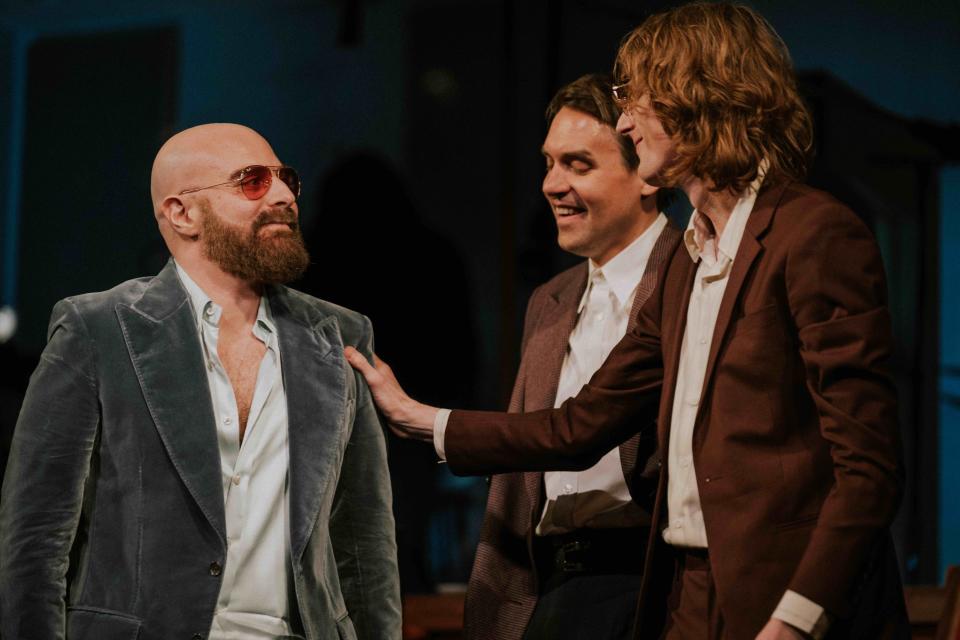
Surprisingly he said yeah, I’ll do it. He brought on Ryan Rumery who is the sound designer because he loves Ryan. I had worked with Ryan before too, so I like him, and he brought on Justin Craig the music arranger, and then I brought on Will Butler through a friend of a friend. And I knew I wanted David Zinn who I’ve been trying to work with for years. And so, we sort of built this company and then everyone just said okay great, and then they waited for me to write. It took a really long time. I didn’t know how long it was going to take but it took a while to figure it out.
DEADLINE: How long did it take?
ADJMI: I did some research in 2013 but I started in earnest around Thanksgiving 2014 and then we were done by…not done done but I would say 96 percent done by the summer of 2019. We were ready to go. So, it wasn’t really as long as people think, but Covid killed us. We were supposed to have a different production in 2020 and that fell apart because of Covid and I’m really grateful that it did in a way because I’m so happy with where we ended up and how it came out. So, I think maybe that was fortuitous in the end.
DEADLINE: I’m wondering if as you were writing were there versions of it that differed significantly from the end result?
ADJMI: I was playing around with very picayunish details in the early version. I just thought how little can I put on this and still have it be substantive. So, there were a lot of conversations that went absolutely nowhere, with no action. People just chatting. I was just learning about the characters. I was in a way auditioning the characters and trying to figure out who they were when no one was looking. So, I sort of wrote a lot of stuff like that. I’m not the kind of writer that does a lot of extensive revision in terms of, Oh it’s this way but now I’m going to make it go 180 and then make it that way. I don’t usually do that. I’m pretty intuitive and I sort of home in on the force field around the play and then I sort of get more granular and more specific as I go.
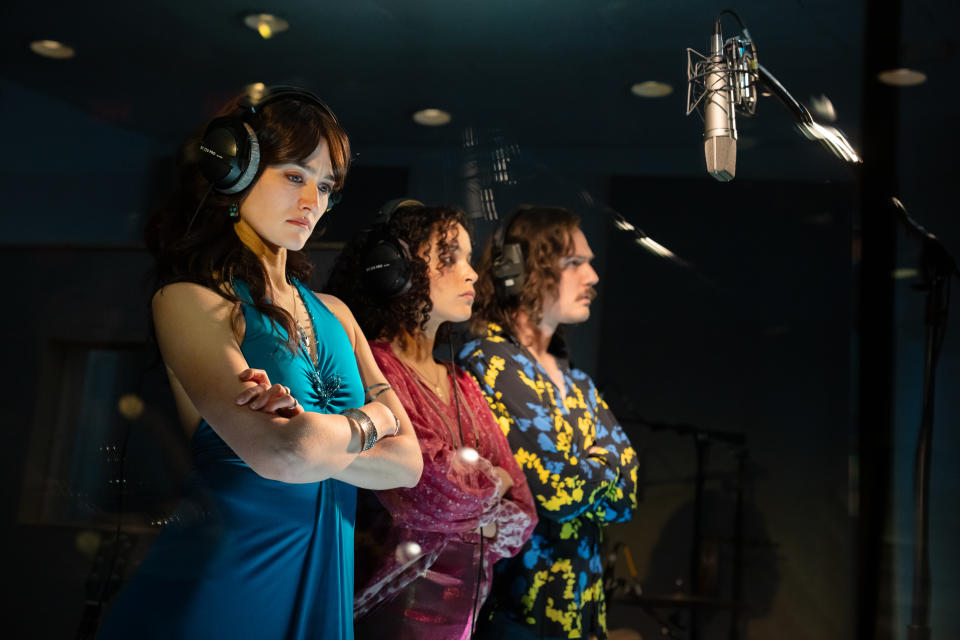
DEADLINE: Your play 3C was sort of loosely based on Three’s Company and I think you’re working on something about Brian Wilson. You find inspiration in real-life people and events. Of course this one’s about – well, are we saying Fleetwood Mac? Critics seem to be couching it a bit, but it is….
ADJMI: There’s a skeleton and superficial details that I put in and blended with stuff in order to build my own world, but I think, you know, the superficial details are only like a fraction of what it is. It’s a small fraction. I think people get really caught up with the superficial details but actually the way that I built it and the way I infused this with myself and my own struggles and my own idiosyncrasies and the way that I created a structure and a form for this thing it’s really not like anything. All of my plays are based on things.
Stunning, my first play that I did in New York, was based on A Streetcar Named Desire. I did another play based on A Delicate Balance by Albee but I sort of do my own thing with it. I pull stuff out and then I find myself. I meet with that material and I find myself in it and then I build it out from there. So, I know why people are saying, Oh it’s the Fleetwood Mac story, but I don’t know Fleetwood Mac. I never met them. You know what I mean? There is no beginning and end to a Fleetwood Mac story. You know, this play is its own invention.
DEADLINE: But as you say the superficial details are there. The Lindsey Buckingham character has a brother who’s an Olympian, that sort of thing.
ADJMI: But I’m teasing out those details in order to build dramatic substratum. I don’t know anything about Lindsey and his brother. I just know one little detail and then I sort of said, What if I spin that into stuff and what if I create a whole world around that, and you know, I have no idea what Lindsey Buckingham’s relationship with his brother or his family is like. I wouldn’t begin to assume that I know anything about that person. So, yes, I’m teasing and playing with superficial details that I know and dancing with them in order to create something new.
DEADLINE: Which also makes for great fun for music nerds, this element of, “Oh wait I know what that connection is. I know what this reference is.” As an audience member we like to pat ourselves on the back when we recognize something from real life. There’s no denying that element of fun.
ADJMI: I agree. I agree. I mean a friend of mine who’s a very well known actor called me and said, It’s pure pleasure, David, and I felt that was such a compliment because I feel it’s pleasurable to be in this world too, which is why I committed to it so extensively for such a long period of time – I actually just love the world of it. I could just swim in it forever.
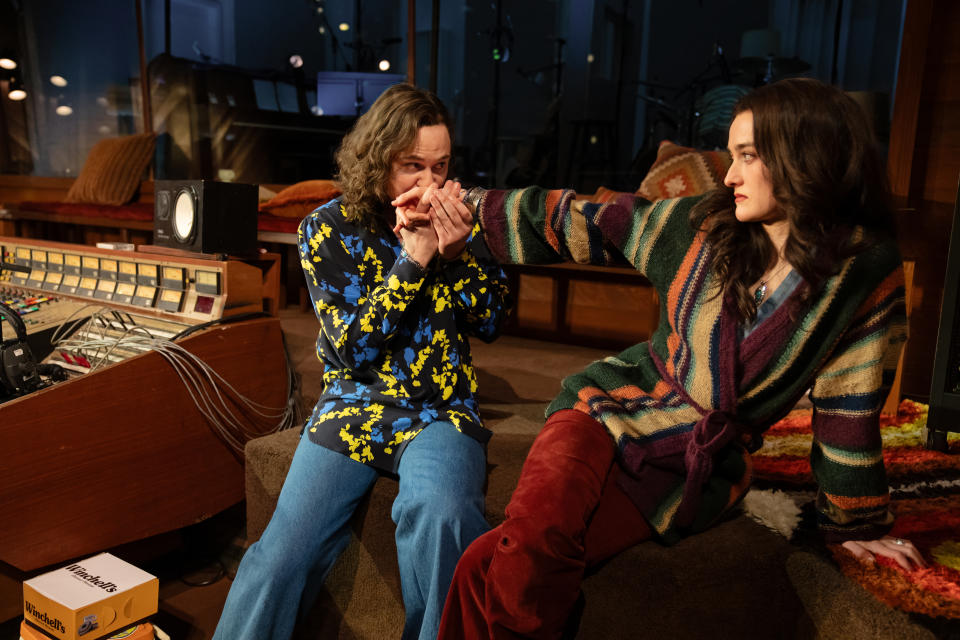
DEADLINE: As an old fan of ’70s music, just to see how it came together, to see that studio, that amazing set, and to think, “So this is what it would have been like to be a fly on the wall back then…”
ADJMI: And I didn’t know anything about that stuff when I started. A lot of that discovery that I think you have as an audience member mirrors my discovery as I was learning about the process, because when I began I just didn’t know anything. I didn’t know what mixing was. I didn’t know what overdubs were. I didn’t know what anything was and so I was fascinated to see how challenging the process could be and how involved it was. I was blown away by that. And so I tried to make that part of the dramaturgy of the play.
DEADLINE: We see the level of talent, genius really, in some of the band members when they’re playing something that sounds perfectly fine to us but they stop playing and say, No that’s not right do it again, and we think what are they hearing? What are they hearing that I’m not? Then they play it again and we feel, Oh, that’s what they were hearing.
ADJMI: It’s wild and it’s such a testament to the work all artists do that is invisible to us. When Thelma Schoonmaker is editing a film with Martin Scorsese, we don’t see the hours and hours and hours of backbreaking work that go…I mean that’s a whole other play, but just dealing with the process of making something. What’s so rewarding to me is that when people hear Will Butler’s album, they talk a lot about the play, like, Oh, Now I know the process of them making that song. I know what went into her hitting that note that she hits in that song. and it becomes almost Brechtian. It’s like almost like a Marxist reconstruction of itself. The play is going: See you have the product, but you also have the process, and you have a full experience of what these songs are and all the backbreaking work that went into it. That’s very cool to me.
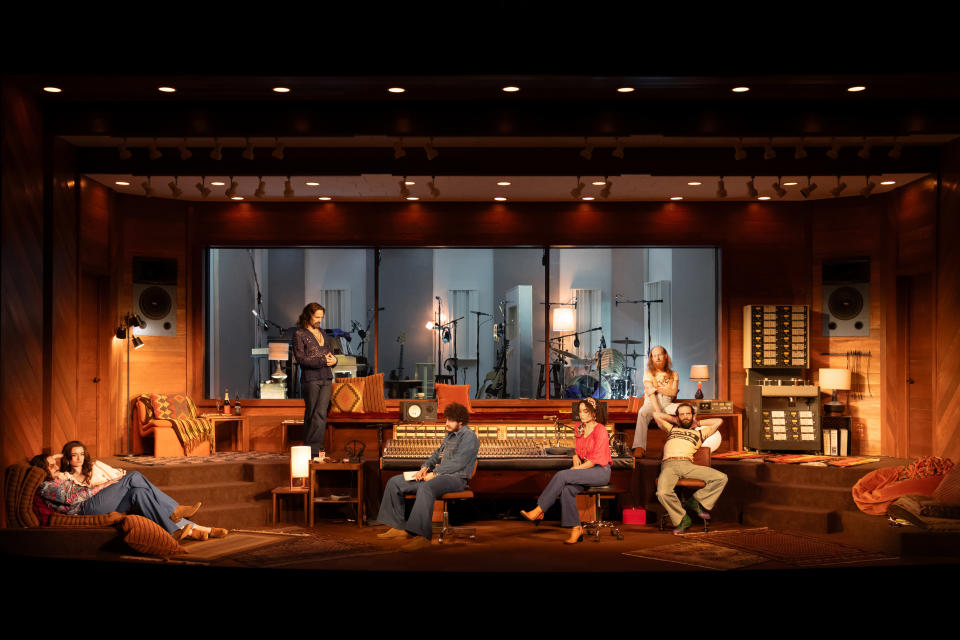
DEADLINE: Say a little bit about the actors because they’re amazing in this.
ADJMI: I don’t know if you have enough time because I’m so infatuated with them as a cast. You know, it was a very hard play to cast and for obvious reasons. They had to play instruments and they have to be singers and they had to have wild charisma in order to be believable as band members and rock stars. I didn’t want them to feel like musical theater actors, I didn’t want it to exist in that idiom at all. So it was hard to find people who had a kind of grit to them or felt they could be of that ’70s period. The audition process took many, many months.
A lot of actors wanted to be in this play. We got thousands and thousands of submissions that the casting people had to whittle down to, you know, a small number that we could actually look at and take seriously. The people in the band had to do very grueling auditions. They had to play their instrument and play guitar songs or play bass or play this or play that and they had to sing. They were singing and then they had to do the actual acting auditions. It was grueling.
I hate auditions because I feel so bad for the actors, and all the people who auditioned were so incredible. You know, some people were more right than others but we knew we had to be very picky, and we had to…I mean it’s all in the casting. It wouldn’t have worked with people that you couldn’t believe in the roles or that couldn’t sing and you couldn’t believe them as a band. So, what we ended up doing was we defaulted toward, okay, can they act? Can they be in a very nuanced difficult challenging tonally complex 200 page play? Can they do that and can I buy them emotionally, the emotional reality of these people, and then can they sing, and then okay if they can’t play instruments we’ll get them music lessons which is what Playwrights Horizons ended up doing for everybody except for Chris Stack because Chris is an accomplished drummer, but everybody else had very, very minimal to no training whatsoever. Will Brill had never picked up a bass prior to doing it, and Will was doing workshops. Will had been involved since 2016 doing workshops of the play, and it was only when we were doing auditions in 2023 and I’m friends with Will’s girlfriend and she said Will would be willing to learn the bass right now if you cast him. So then I said, Will would you really be up for this? And he said Yes, yes, I’d be up for it. So, that’s how Will happened.
DEADLINE: I know people who’ve been playing for years and couldn’t do that.
ADJMI: He’s really talented. My friend Steve is in a band called the Weepies and he came to see us and he said Will Brill could play bass in a band if he wanted. Like he’s the real deal. So, it’s wild.
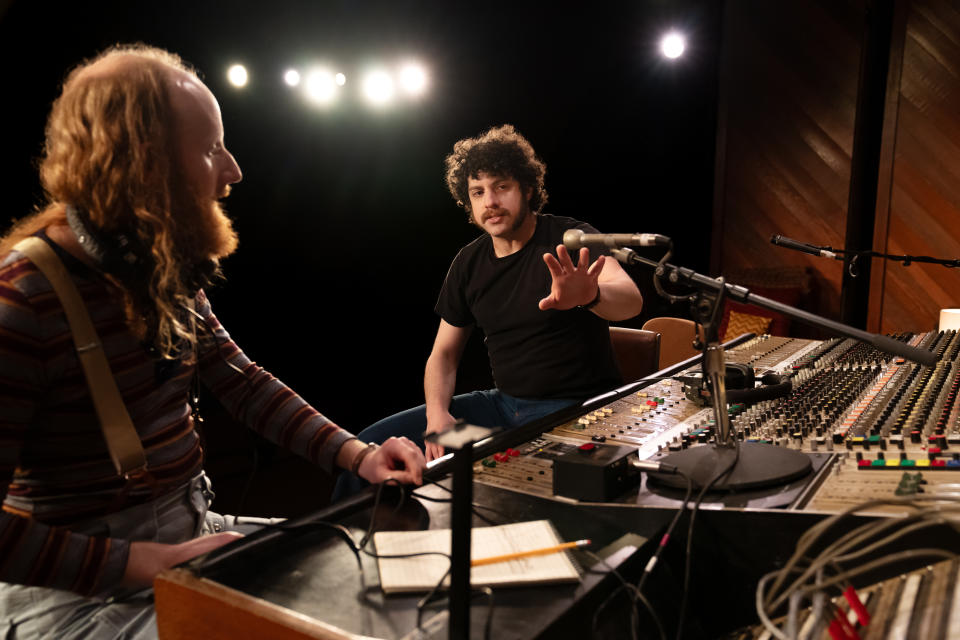
Eli Gelb, I’d seen in a musical Daniel directed called Skintight, Joshua Harmon’s play, and I wrote to Daniel after I saw him. Eli played a young gay man, and I thought I’m going to write Daniel and say what a sweet young gay man that actor was, and Daniel said no he’s not gay and I was like what? He’d created a character that was so utterly believable and nuanced and incredible, and I thought he’s amazing. And then when he came into audition for Stereophonic I was like, I don’t know, is he the character? And he just blew me away. He just blew me away.
Andrew Butler we found in a way downtown show and he was doing workshops with us also since I think 2015 or 2016. He is a very accomplished composer and musician, but his character Charlie doesn’t play a lick of music in this play. It’s so funny.
And then Sarah Pidgeon we just found in an audition. I had never heard of her in my life, and I remember we were just kind of gobsmacked when she came in. It’s like, what is this? What’s happening? The thing about Sarah that’s so incredible is that she was the only person I think that really understood Diana’s humor. She’s dryly funny and she’s poking fun of herself a lot of the play and a lot of people came in to do that audition and they did it very serious and very earnest, and I just loved Sarah’s ability to kind of see these different tones in her. I think she is just heaven. I just adore her.
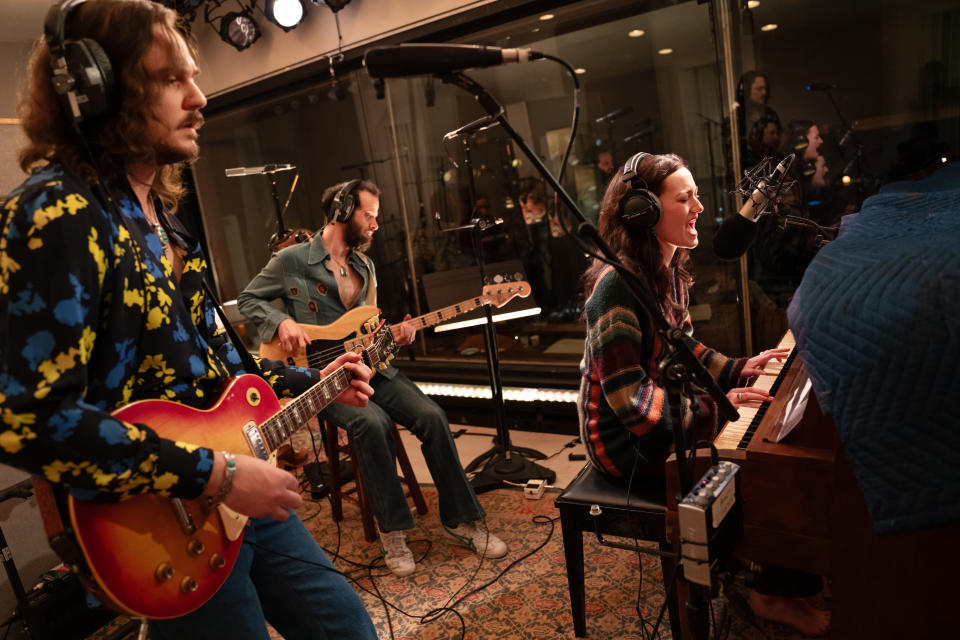
DEADLINE: Her performance is a real star is born moment. Even if you’ve seen her in other things, it’s like, Wait, where did she come from?
ADJMI: I’m so happy that you’re saying that. This is a part that’s designed for that. I mean it’s like she does the triple axel and it’s quite something. We didn’t know about her voice. I mean she had a nice voice but it wasn’t until very early previews or maybe late in the tech process where suddenly she became a rock star. It just happened out of nowhere. No one had a conversation with her about it. She was singing and it was lovely, but I didn’t feel that thing and then all of a sudden it’s like, Oh she’s a rock star. It just happened. It was quite miraculous.
Then Tom Pecinka. We found him in an audition and that audition I’ll never forget it as long as I live because everybody was sobbing uncontrollably because he was so unbelievable, including the woman who was the reader with him. We just had a reader coming in to read the scene with him and she could not stop sobbing. Tom is just the most honest, raw…he’s so honest he cannot be dishonest. He’s incapable of dishonesty as a human being and as an actor. When he walked into the room, he wouldn’t look at us. Everyone else shook our hand and said oh hi and smiled and ingratiated themselves. Tom didn’t look at us, didn’t shake anyone’s hand.
He was, like, Leave me alone, I can’t look at you. I got to just do this part, and I thought he’s like Harvey Keitel or something, who is this guy? Then I thought he had a lot of bravado, but then when he had to do the guitar audition the music director whispered to him and pulled him aside for a second and then later I asked Justin, the music director, what did you say to Tom? And he said, “I told him his hand was shaking so much, he was so nervous that he couldn’t play, so I said to him you’re so good, please calm down so you can play the guitar and do this audition because everybody loves you.” I thought oh my god he was nervous. I just can’t say enough good things about him.
And Chris Stack I worked with in Marie Antoinette 10 years ago and I always loved him and he’s just a stalwart of Broadway. I mean everybody knows and loves Chris Stack and it was just a no brainer. He did a reading that I was like, Oh my god that’s exactly who this character is. That’s what I heard in my head. I just got very, very lucky.
And Juliana Canfield. Juliana actually did a reading at Playwright’s Horizons early on and Alaine Alldaffer the casting director suggested her, and I knew her from Succession only, but she had a small role in that, and she came in and just nailed it. I thought she’s perfect, but can she sing? We asked her agents and they were like, She’s not going to do a singing audition and I said we need to know if she can sing. We can’t just cast her. She has to sing. They said okay we’ll send you a tape. And that went on for three months. She refused to send the tape. She was too nervous to send it, I found out later. And when she sang on this tape, she sang a cappella and it was stunning. I was like what is she so scared of? She’s got a gorgeous voice, and we cast her right way.
DEADLINE: That real-life vulnerability gets back to the idea of this play, the vulnerabilities and insecurities of people we glorify on the stage.
ADJMI: And it’s so human. Everybody has that. Everybody feels that way. Actors feel that way. Musicians feel that way. It’s wild to see people that we idolize and that we build mythologies around and then to really touch the part of them that is so fragile and so human, and I’m so interested in that junction or that apparent disjunction. How could you be so magical and so miraculous and be this superhero and then have all of this other really wildly human stuff that is so flawed and so tender? That was definitely something I was interested in exploring from the beginning.
DEADLINE: About the Tonys, what surprised you most?
ADJMI: I was thrilled that we got nominated for best play and I figured we’d get a few more nominations and that would be great and I would be thrilled and if we didn’t I would still be happy. Then when five of my actors got nominated, I burst into tears because I was so happy for them. It’s such a testament to the collaboration that we all have. This is an expression of all of us. This is a tandem expression of this production, and we made it together and you can’t separate anybody. The design, the direction. Everyone just sort of brought their full selves to it and committed 125 percent. So it just blew my mind that the nominators acknowledged that, and I did burst into tears because I was so happy.
Then my agent texted me and said that we had broken a record or something I just kind of short circuited. I was like what are you talking about, and I sort of went into a fugue state and I’m just now coming out of it – it’s taken me a few weeks. It’s stuff that you don’t think you care about, but it’s sort of like when I went into the theater for the first time with the cast and we were standing at the mezzanine and everyone just looked at each other and our eyes were filled with tears. You just feel something momentous and monumental and you’re part of history.
My friend Zoe Caldwell did Master Class in that theater and Chris Durang my teacher did his play in that theater and you’re part of this lineage now and there’s something about Broadway. Broadway is a huge platform for theatre, and it matters. It matters in terms of the history of it and in terms of the consciousness of people around the world. I can’t really wrap my head around it honestly. I mean when people say it’s such an honor it sounds so boilerplate but you really feel honored. I feel such a deep, deep feeling of honor and gratitude. It’s quite wild.
DEADLINE: I thought you were going to say the big surprise was the score.
ADJMI: It’s never happened that a play was nominated for best orchestrations. That is unprecedented. That was history making for Justin Craig and I know why – because his work was so unbelievable. Justin Craig, remember that name. He is magic and he was so invaluable to this whole thing, and I got so close with him over the process. We worked so intimately, and he was so open to collaboration it’s quite amazing. Yeah, I was so thrilled, and I was so excited for Will [Butler]. There was so much great work on Broadway and Off Broadway this season and there were so many actors I wanted to see recognized like the Jaja‘s actors were just tremendous, and Susan Pourfar [Mary Jane]. And Frances Benhamou [Prayer For The French Republic], oh my god, she blew my mind.
DEADLINE: Her absence from the list is perhaps the biggest injustice of this year’s nominations, I think.
ADJMI: I think so too. I emailed her about a week ago and just said you’re tremendous. I will never forget that performance. I don’t care what you get or don’t get, but she’s on another level and she’s going to be great because this is the beginning for her, but you know I couldn’t help but be happy for my cast. I love them too. I love them too. I don’t believe in competition art. Yes, you do it but in the end it’s all about the art and it’s all about the connection that you have in the theater with these performers and this vision. And that can’t be quantified so easily and can’t be boiled down to numbers. I don’t know. I’m totally like I’m just completely blown away by everything that’s happening and I’m just so thrilled for my collaborators because I love them so damn much.
DEADLINE: One last question. Any ideas of the future of Stereophonic? Have there been talk of other productions, about movie deals? I really want to see this as a limited series on Netflix.
ADJMI: Well, I can’t say specifics but yes there’s talk of movies and I’m talking to film directors right now and some of them are really thrilling and exciting meetings and I don’t know what I’m going to do exactly but I’m interested in adapting it as a film probably. And there will be other productions and we’re figuring out the specifics right now, and I can’t really say more about it but there will be more of a light for it. We have to figure it out because it’s hard to just give this play to people. We have to sort of figure out how we’re going to do it.
DEADLINE: I think that was the same problem the producers of Kimberly Akimbo had. How do you do that play without Victoria Clark? Or how do you do What the Constitution Means to Me without Heidi Schreck?
ADJMI: But they managed to do it without Heidi, who is one of my best friends. I saw it with Maria Dizzia at the Taper in LA and she was incredible in it. She was so good. When people say that to me about how can you do it with a different cast? It’s not easy. I don’t know. It will be very, very hard…this is a very hard play to get just right the way we did with this cast.
DEADLINE: The hope, I suppose, is that a different cast will bring something to the play that you yourself never imagined.
ADJMI: A hundred percent.
Best of Deadline
Hollywood & Media Deaths In 2024: Photo Gallery & Obituaries
TV Cancellations Photo Gallery: Series Ending In 2024 & Beyond
2024 Premiere Dates For New & Returning Series On Broadcast, Cable & Streaming
Sign up for Deadline's Newsletter. For the latest news, follow us on Facebook, Twitter, and Instagram.

